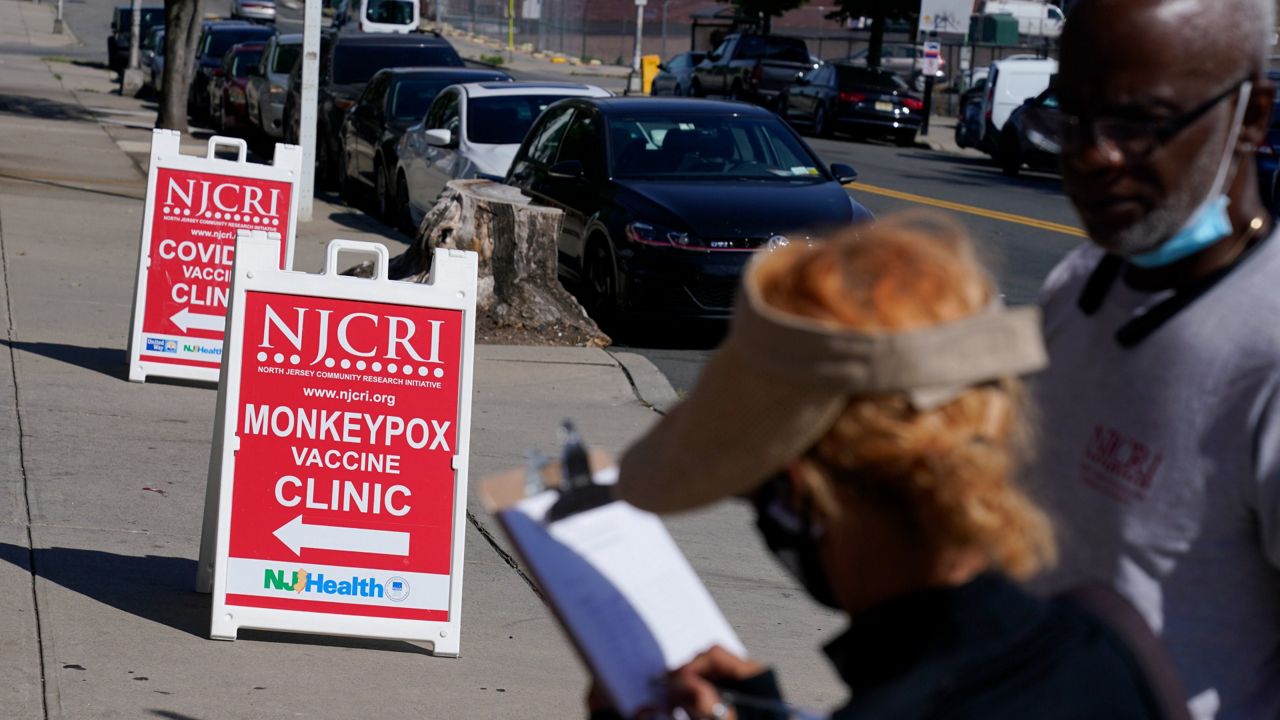In a series of monkeypox-related announcements Wednesday, federal health officials said early real-world data show the vaccine Jynneos is effective at preventing infections.
What You Need To Know
- In a series of monkeypox-related announcements Wednesday, federal health officials said early real-world data show the vaccine Jynneos is effective at preventing infections
- The FDA approved the vaccine in 2019 for smallpox and monkeypox, but there has been little data on how Jynneos performs against monkeypox in the real world
- The study found that eligible people who were not vaccinated were about 14 times more likely to be infected by monkeypox than those who were inoculated
- Federal health officials also announced Wednesday they are expanding vaccine eligibility and are allowing vaccines to be administered in locations other than the forearm
The Food and Drug Administration approved the vaccine in 2019 for smallpox and monkeypox, which are part of the same family of viruses and have similar symptoms. But there has been little data on how Jynneos performs against monkeypox in the real world.
The Centers for Disease Control and Prevention on Wednesday released the first findings that “provide us with a level of cautious optimism that the vaccine is working as intended,” the agency’s director, Dr. Rochelle Walensky, told reporters.
The study found that eligible people who were not vaccinated were about 14 times more likely to be infected by monkeypox than those who were inoculated.
There also were signs of protection beginning as early as two weeks after the first vaccine dose. The vaccination series requires two doses ideally administered four weeks apart.
The study relied upon newly available data from 32 states from July to September.
Despite the signs of protection, health officials stressed that people should not stop at one shot.
“We know from laboratory studies that immune protection is highest two weeks after the second dose of vaccine,” Walensky said.
There have been more than 25,000 monkeypox cases and one related death in the United States. The rate of new infections has slowed from a peak of 456 a day on Aug. 10 to fewer than 200 today.
There have been more than 66,000 cases worldwide.
The virus, which is transmitted through close or intimate contact, has primarily spread among gay and bisexual men.
Federal health officials also announced Wednesday they are expanding vaccine eligibility. The CDC had recommended the vaccine for anyone who has had recent close contact with an infected person, as well as for gay or bisexual men who have had sex with multiple or unfamiliar partners in the past two weeks. Now moving to a pre-exposure prophylaxis, or PREP, strategy, health officials are recommending vaccination for sexual partners of people who met the previous criteria, which includes commercial sex workers.
“By expanding eligibility and shifting to a PREP strategy across the country, we're looking to ensure those at the highest risk for monkeypox receive the vaccine before exposure and that vaccines continue to be made available equitably to those who need them,” Walensky said.
Health officials also announced they are allowing vaccines to be administered in locations other than the forearm.
To address a vaccine shortage, the FDA last month granted emergency use authorization for the Jynneos shots to be given intradermally — into the topmost layer of skin — rather than subcutaneously — into the fatty tissue below. The strategy allows for one-fifth the amount of vaccine to be used per shot while providing the same immune response, health officials say.
The method has involved giving the shots in forearms, and Dr. Demetre Daskalakis, White House monkeypox response deputy coordinator, said officials have received feedback that some people believe there is a stigma to having the visible, temporary marks left on their arms.
As a result, the CDC will now allow people to receive the shots closer to their shoulder or on their upper back, areas of the body more likely to be covered by clothing.
Daskalakis also announced that the Substance Abuse and Mental Health Services Administration has released an online resource to help people experiencing stress and anxiety related to monkeypox and sent a letter to SAMHSA-funded organizations telling them they may use grant money or staff for monkeypox-related activities done in conjunction with their usual work.
The goal, Daskalakis said, is to prevent anxiety or other mental health issues from being a barrier to vaccination.



